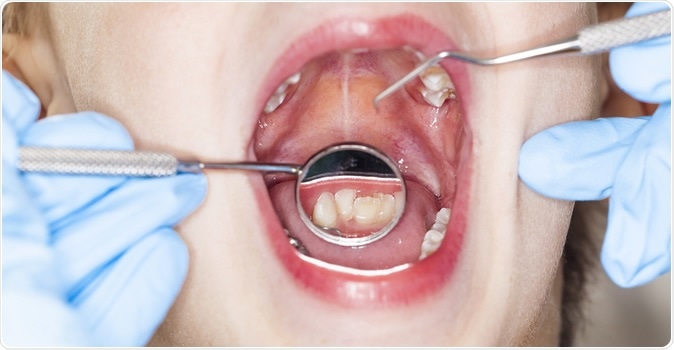According to a latest study published last Friday in the Journal Pediatrics, children who are breastfed for over two years are more likely to develop caries or cavities.

Inspection of the oral cavity dental dentist. Image Credit: Oleg Malyshev / Shutterstock
For the study the researchers looked at breastfeeding behaviors and sugar consumption among 1,129 children in Pelotas, Brazil born in 2004. The community has a public fluoridated water supply. Fluorides help in preventing teeth decay and cavities. Information regarding breastfeeding was collected at several intervals viz. - 3 months, 1 year and 2 years old. Sugar consumption was noted at ages 2, 4 and 5 years. For sugar consumption, a list of food items in a questionnaire was used. Zero or less than twice daily consumption was termed as “low sugar consumption”. “High sugar consumption” meant two or more times daily.
At the age of five years, the children were taken to see a dentist. They were examined for decayed teeth, missing teeth and milk teeth that had required a filling due to cavities. Severe cavities and severe early childhood caries cases were also recorded. Severe early childhood caries is usually denoted by six or more decayed, missing and filled milk tooth surfaces.
Results showed that among the participating children, nearly a quarter of the kids (23.9%) had severe cavities and nearly one in two (48%) had at least one tooth surface that was affected by a cavity. Mathematical calculations correlating eating behaviors including breastfeeding showed that children who were breastfed for two years or longer had a 2.4 times higher risk of having severe cavities when compared to those children who were breastfed for less than a year. The study noted that breastfeeding between 12 and 23 months was not linked to a higher risk of cavities. In the study only around a quarter children were breastfed for 24 months or longer.
Dr. Karen Glazer Peres, lead author of the study and associate professor at the University of Adelaide in Australia explains that there is a reason why this trend is seen. She said that most children, who are breastfed beyond two years, tend to feed on demand at night. Night feeds mean that the children do not get their teeth cleaned after the demand feed. This could mean stagnation of the milk within the mouth and this could lead to cavities. Breastfeeding along at two years of age or more is not the culprit say experts in the field. The contributors are also excess consumption of sweets and candies.
The study also explored the socioeconomic connections that could lead to an increased risk of dental caries. For example risk of caries and severe cavities was higher among children who come from a family of low income or those with a mother who has had less schooling.
Peres said that there have been similar studies in the past. While some of these have shown a positive correlation between prolonged breastfeeding and dental caries, some have failed to show any connection. She said that this particular population may be at risk. The results may not be applicable to other populations around the world. Other factors such as exposure to fluorides in water and environment could also play a role she explained.
Peres herself led another study when she had found that exclusively breast feeding for 6 months meant that babies are 72% less likely to have crooked teeth. “Baby bottle tooth decay” is another condition that affects bottle fed babies and breast fed babies are spared of this. The American Academy of Pediatrics (AAP) recommends breastfeeding babies for a year and continuing for longer if the mother and child wish to. The World Health Organization recommends breastfeeding up to two years or longer citing benefits of breastfeeding both for the baby and the mother.